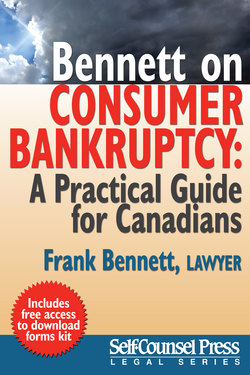Читать книгу Bennett on Consumer Bankruptcy - Frank Bennett - Страница 23
На сайте Литреса книга снята с продажи.
6. The Registrar in Bankruptcy
ОглавлениеThe registrar in bankruptcy is also a court official. The registrar has the authority to rule and judge certain types of cases. Depending on the need, there is usually only one registrar in each province whose office is close to the superior court in the capital. However, there may be deputy registrars in other cities of the province. The deputies have the same authority as the registrar.
In Ontario, there are two registrars who sit in Toronto; there are also deputy registrars, one in London and the other in Ottawa. In Quebec, there are several registrars located in major centres.
The powers of the registrar are set out in the Bankruptcy and Insolvency Act. The registrar can —
• hear cases where both sides have agreed to some solution of a problem;
• examine any person under oath who has knowledge of the bankrupt’s affairs;
• grant orders of discharge; that is, once the debtor is in bankruptcy, the debtor will usually want to get out or get “discharged”; that hearing can take place before the registrar;
• make orders in urgent cases;
• determine matters relating to proofs of claim; and
• fix the fees of the trustee and the fees of the lawyer for the trustee.
With respect to discharge hearings, the court administration determines whether the discharge is heard by the registrar or bankruptcy judge. The registrar also has other powers that are of a more technical nature.
